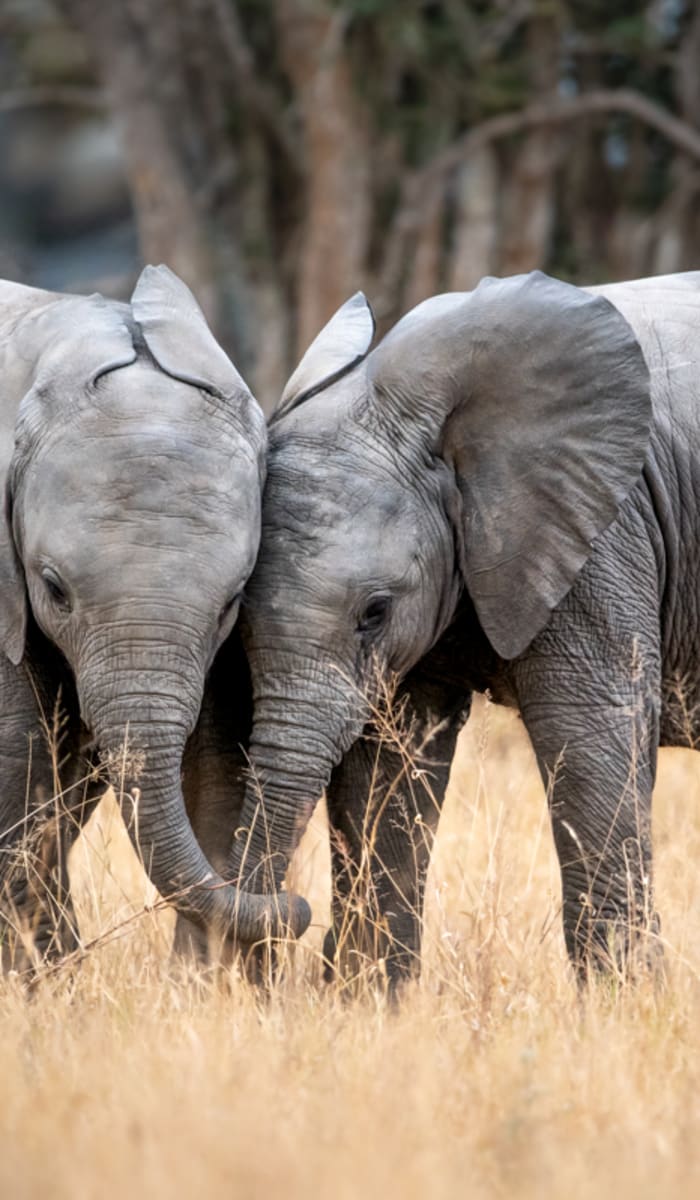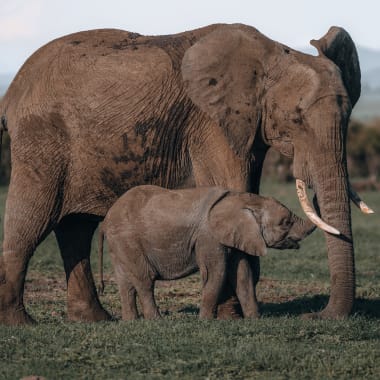
Kruger National Park
South Africa's impressive safari paradise
South Africa's impressive safari paradise
Located in the north-east of South Africa, around 450 kilometers from Johannesburg, it is a wonderful natural area with a unique fauna. As the largest national park in the country, the Kruger National Park is a true paradise for wildlife: in addition to its vastness, it also benefits from boundless freedom. Visitors can choose from a wide range of activities and unusual accommodation, so there is something to suit every taste. Whether as a couple, family or honeymooner - everyone will find their own personal, unforgettable adventure here.
Best time to travel
Why the Kruger National Park is so special
Picture-book landscapes, one of the highest animal densities on the continent as well as wildlife and luxury at the same time - this South African place is all about diversity.
Geography
The Kruger National Park stretches from the border with Zimbabwe in the north to the border with Mozambique in the east and lies in the southwest of South Africa. The diverse landscape is characterized by several rivers, riverbanks, forests, flat and hilly areas and mountains. The flora is correspondingly diverse with grass-covered areas, shrubs and many different tree species.
Kruger National Park versus Greater Kruger Area
The Greater Kruger Area is located to the west of the Kruger National Park. Covering an area of 1,800 square kilometers, it is home to numerous game reserves of the Associated Private Nature Reserves. The border between the Kruger National Park and the Greater Kruger Area runs without barriers, giving the animals valuable space to roam. Guests of the Greater Kruger Area have the opportunity to visit the Kruger National Park for a small fee. The Greater Kruger Area, on the other hand, is exclusively for guests of its private reserves. This has the advantage that the density of visitors here is much lower than in the Kruger National Park. In addition, there is a large selection of luxurious accommodation, which provides even more exclusivity.
The Kruger National Park scores with a wide range of standards in the reserves: from simple bungalows to exquisite lodges, everything is available. In addition, exploring the area is much easier, as visitors are mainly on the road in their own vehicles. In the Greater Kruger Area, guided safaris are preferred, which benefit from the in-depth knowledge of the guides. As the flora and fauna in the two areas do not differ from each other, the choice of these two places depends solely on the type of trip you prefer.
What are the differences between the Kruger National Park and the private protected areas?
A national park is owned and managed by the state. A private game reserve, on the other hand, is privately owned and managed. However, there are regulations relating to nature conservation that must be adhered to - regardless of the ownership of the areas. Another difference is the opening hours: Unlike private game reserves, these are in place in national parks. In private game reserves, on the other hand, guests can enter and leave at any time.
Diversity of wildlife
Due to its high animal density, the Kruger National Park is one of the most important nature and wildlife reserves in the world. Animal species threatened with extinction have the opportunity to fully develop within these protected areas. The basis for this is an intact ecosystem. In particular, this is based on a ban on all external interventions that could impair the protection of flora and fauna. The rewards of this can be seen in the magnificent, untouched nature and the very high number of wild animals that are allowed to live their lives in the wild. However, this does not mean that there are no more endangered species. Unfortunately, the density of animals also has a downside: the loss of natural enemies and the ban on hunting leads to a rapid proliferation of animals, which can put pressure on the ecosystem. This makes it all the more important to raise awareness and continue to do everything humanly possible to protect nature and find solutions to these problems.
Visitors to the Kruger National Park can look forward to encounters with impala (an African antelope species), African buffalo, Burchell's zebra, blue wildebeest and elephants. However, rhinos, crocodiles, hippos and hippos, giraffes, lions, spotted hyenas, warthogs, leopards and waterbucks are also increasingly present. This gives you the chance to encounter the coveted Big Five, consisting of elephants, rhinos, buffalos, lions and leopards. Of the animal species listed, it is lions and crocodiles that are under threat due to increasing disease. In addition, bird, fish and amphibian species also enrich the Kruger National Park.
Safari experiences and other activities
Whether game drives on your own or guided hikes - safari experiences are clearly the main focus in Kruger National Park. After all, there is a lot to discover on almost 20,000 square kilometers. In total, there are around 2,000 kilometers of developed roads leading through the landscapes, where wildlife encounters are a regular occurrence. However, to protect the animals, the area itself may not be driven on and may only be visited on foot with a trained park ranger.
But the experiences with the wild animals are just one of the highlights. The landscape is also picturesque. The vast steppe and grassy plains are only interrupted by rivers and waterholes, which gives the whole area its special charm. Mountain ranges adorn the background, with densely overgrown areas in the middle.
Exciting activities such as zipline tours provide that certain something: those with a head for heights can whizz through the African bush on a cable car. Or how about a mountain bike trip through the Kruger National Park? Specially designed trails lead you through the bush by bike. There is also a golf course - for those who want to take an active break from their safari experiences.
The best time to visit the Kruger National Park
The Kruger National Park is a paradise for wildlife spotting. But when is the perfect time to explore this natural wonder?
The best time to visit the Kruger National Park depends on your preferences. Are you a photography enthusiast, a birdwatcher or someone who wants to experience the vibrant life of nature up close? The dry season offers unparalleled safari experiences and easy game viewing. The rainy season, on the other hand, beckons with vibrant landscapes and the birth of new life. Each season has its magic, its stories, its unique atmosphere - which one will you choose?
THE DRY SEASON: MAY TO SEPTEMBER
The months from May to September are characterized by clear blue skies and mild temperatures, ideal for safari enthusiasts. During this time, when water is scarce, the animals gather at waterholes, a spectacle that nature lovers should not miss. The vegetation is sparser, the visibility clear - perfect for experiencing the majestic wildlife in its full splendor. However, you should be prepared for the night-time temperatures to drop to between 7 and 9 degrees.
THE RAINY SEASON: OCTOBER TO APRIL
With the start of the rainy season, the park turns into a green paradise and the wildlife welcomes the new season with offspring. With average temperatures of over 30 degrees, it can get very warm and humid at this time. It is at its warmest and most humid from December to February. Although the animals can hide better in the lush landscape, the season offers unique photographic opportunities. Nature is in full bloom and the birdlife is more diverse than ever - a wonderful time for birdwatchers.
PRIVATE NATURE RESERVES THAT YOU SHOULD NOT MISS
If you want to stay in exquisite surroundings but don't want to miss out on the incomparable nature and its safari experiences, you should take a look at the following two private reserves.
Timbavati Game Reserve
On 75,000 hectares of untouched wilderness, guests of the Timbavati Game Reserve have the wonderful opportunity to enjoy comfort and luxury while immersing themselves in pure nature. Flora and fauna can be seen here in all their splendor. Even the mightiest of wild animals - the Big Five - can be seen around the Timbavati Game Reserve. Whether at dawn, when the African wilderness comes to life, or at night against a mystical backdrop, under a breathtaking starry sky and with the special sounds of the night in the background - the guided day and night drives and hikes promise exclusive insights into the life of the wild animals.

Sabi Sands Game Reserve
A romantic ambience awaits guests at Sabi Sands Game Reserve. Rivers meandering through the landscape and cottages built on hills with pointed thatched roofs add to the charm of this enchanting area. Lovingly crafted details of traditional art adorn the lodges. Several viewing platforms and pools set into the rocks make for heavenly moments. But the choice of different types of accommodation is also extensive here. The focus is also on wildlife spotting: the Sabi Sands Game Reserve is particularly famous for its fascinating leopard sightings.

Safaris in Kruger Nationalpark
An unforgettable safari experience. The wildlife and the landscape were simply breathtaking. Our guides were excellent and the walking safaris in particular were a highlight
Lodges in Kruger National Park
To book a trip or for more information, contact us. We'll help you plan and guide you through your upcoming adventure!








